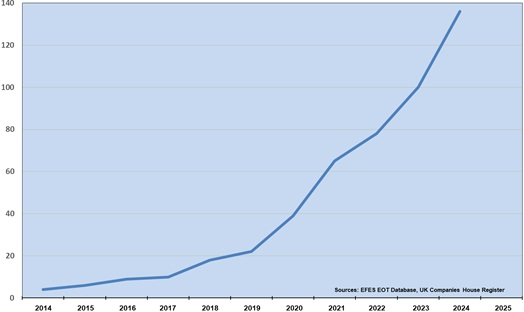|
EFES NEWSLETTER - DECEMBER 2024
|
In
the UK, we are fast going to the figure of one in 10
SMEs being employee-owned. This is a real revolution
for employee ownership. For the first time, this is
no longer an experimental phase, but a transformation
affecting all businesses and economic life.
This change is happening in response to a need: that
of business transfers. Every 20 years or so, there is
a new generation of owner-managers.
The fact that they do not have to invest a penny of
their own money makes transferring businesses to employees
much easier. This can happen on a large scale thanks
to the legal mechanism of trust.
A variety of skills is needed to effect the transfer
of a business to employees: legal and tax advice, valuation
and accounting, organisation and governance, communication,
...
When business transfers to Employee Ownership Trusts
began in the UK in 2014, there were still only four
teams of lawyers capable of organising these operations.
Since then, the number of teams has grown exponentially
(see chart). This has allowed many more such transfers
to be carried out, validated by a growing number of
experts. Back in 2012, the Nuttall
Review announced that this would be a key success
factor.
|
Business transfers to employee ownership in the UK
Number of dedicated legal advice teams

|
Now
what about the Netherlands?
It has the same needs for business transfers.
Moreover, the Netherlands was the first continental
country to introduce legislation allowing the use of
trust mechanisms. It did so as early as 1985, 20 years
ahead of Belgium or 25 years ahead of France. In the
Netherlands, these mechanisms have long been used to
organise corporate shareholding, including certain forms
of employee ownership. This is what they call a STAK
(Stichting AdministratieKantoor).
So today, the Netherlands is undoubtedly in the best
position on the European continent to make the transition
to a new, far more promising use for STAK: one that
allows employees to own their company without risking
a penny of their own money.
Of the 60,000 or so SMEs in the Netherlands, we could
quickly move towards 6,000 employee-owned companies,
as is already happening in Great Britain.
So the question arises:
Which Dutch business advisers will be the first to invest
in this sense?
|
Press
review
A
selection of 28 remarkable articles in 7 countries in November
2024: Belgium, Germany, France, Italy, Great Britain, USA,
South Africa.
Belgium: The dynamics of employee share ownership in
Europe is shifting to SMEs.
Germany: Codecentric is a new case in German non-listed
companies.
France: New successful employee share plan for Capgemini.
Italy: New employee share plans for Fincantieri and
for Eni. Employee share plan with union support for A2a. Un
plan d'actionnariat salariť avec soutien syndical pour A2a.
About employee ownership in British SMEs.
UK: Thanks to the Employee Ownership Trust formula,
one or two new SMEs are transferred to their employees every
day. This month, among others, the case of: Power Electrics,
Everycare Central & Hants, Pearl Automotive, Rega Hi-Fi,
ROL Cruise, EPM Solutions Asset Management, Dafydd Hardy Estate
Agents, Goodson Thomas Executive Search, Montresor Legal Recruitment,
Laxtons Specialist Yarns, Rollstore Handling Equipment, Orchard
Media & Events, Brandnation Communication, Transcendit
IT.
USA: Some examples of ESOPs in the US: Engineers Construction
Inc., Bob's Red Mill.
Certified EO is a certification program for employee-owned
companies in America.
South Africa: The rise of employee share ownership
policies in South Africa.
The full press review is available
on:
https://www.efesonline.org/PRESS
REVIEW/2024/November.htm
|
 A
political roadmap for employee ownership in Europe
A
political roadmap for employee ownership in Europe
 The
EFES needs more members. Download the EFES membership form
The
EFES needs more members. Download the EFES membership form
 What's
new on the EFES website?
What's
new on the EFES website?
 EFES NEWS
distribution: 200.000
EFES NEWS
distribution: 200.000
|